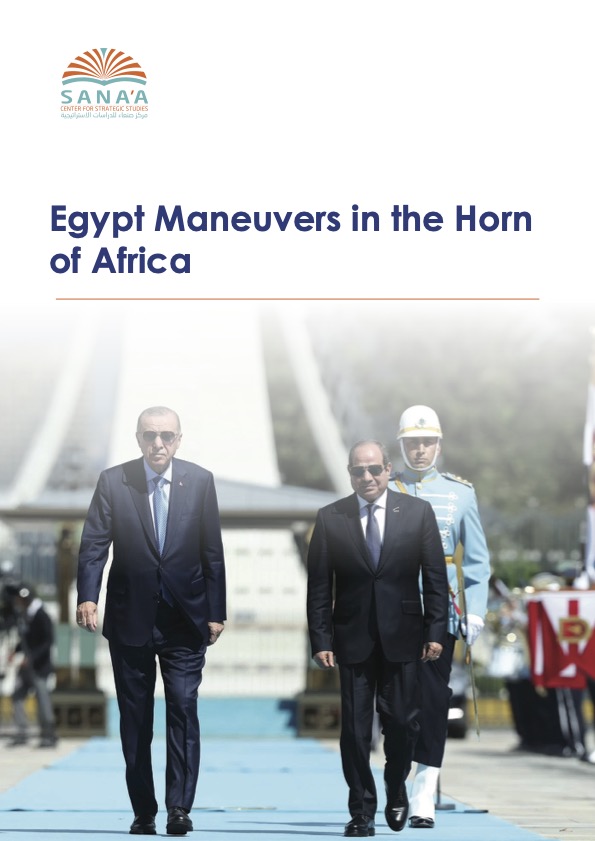Since October 2023, the Middle East has witnessed a series of geopolitical developments, which Cairo has perceived as a direct threat to its national security. These include: 1) the Israeli war on Gaza; 2) Houthi escalation in the Red Sea and a subsequent decline in Suez Canal revenue; 3) Ethiopia’s quest for a seaport and plans to establish a naval base on the coast of Somaliland; and 4) the crisis in Libya and the potential for renewed conflict. This rapid succession of events has shattered Egypt’s longstanding pillars of foreign policy, which for four decades were built on the principles of good neighborliness, non-intervention, and investing in mediation and diplomacy. In response, Cairo has undertaken a series of proactive measures in its regional perimeter this year, signaling a new initiative-based approach to reassert influence in what it considers its vital sphere.
In an effort to address domestic vulnerabilities, notably a severe economic crisis, Cairo has sought to diversify its strategic alliances in the region. Turkey has emerged as an especially important relationship following the gradual normalization of relations over the past three years. Turkish President Erdoğan’s visit to Cairo last February marked a turning point in the collaborative relationship between the two countries and led to the establishment of a High-Level Strategic Coordination Council. Bilateral relations have continued to progress steadily, culminating in Egyptian President Abdel Fattah al-Sisi’s visit to Ankara in September.
The Egyptian-Turkish rapprochement in 2024 has taken on a significant geopolitical dimension, with the two countries’ interests converging in two vital regions: 1) Libya and the broader Eastern Mediterranean; and 2) Somalia and the Horn of Africa. The latter has become an active theater of military operations, and the limits of Egyptian-Turkish cooperation are being tested. Egyptian and Turkish roles in the Horn of Africa will undoubtedly have repercussions for regional dynamics, including the Yemeni arena.
Somalia: The Starting Point
In January 2024, Ethiopian Prime Minister Abiy Ahmed and the President of Somaliland, Muse Bihi Abdi, signed a memorandum of understanding in which Somaliland – a self-declared state that lacks international recognition – grants Ethiopia the right to access 20 kilometers of its coastline and to establish a naval base by leasing a strip of land for 50 years. In return, Ethiopia agreed to recognize Somaliland as a sovereign state and grant its government a stake in Ethiopian Airlines.
This development, coupled with Houthi attacks against shipping in the Red Sea, has intensified regional competition in the Horn of Africa. Somewhat paradoxically, it has also created common ground for cooperation between Cairo and Ankara. Turkey requires an ally to maintain its geopolitical advantage in the Horn of Africa, particularly in the face of what it perceives as a direct threat from Abu Dhabi, which is also vying for a geostrategic presence on the Red Sea coasts and reportedly served as the architect of the agreement between Ethiopia and Somaliland.Cairo, meanwhile, needs a strong partner in the Horn of Africa to bolster its efforts to build an axis including Eritrea, Djibouti, and Somalia, designed to counter Ethiopia’s growing influence in the region and solidify Egypt’s geopolitical presence south of the Red Sea. While Turkey’s motives are primarily proactive, seeking to maximize its regional standing, Cairo’s motivations are defensive, aimed at safeguarding its national security and encircling Addis Ababa, which poses a direct threat to Egypt’s interests, both in relation to the Nile River and the Red Sea.
In the first half of 2024, Ankara sought to unilaterally address the challenges posed by Ethiopia through a blend of military, diplomatic, and political strategies. In February 2024, Turkey and Somalia inked a framework agreement for defense and economic cooperation. The same month, Turkey signed three military and economic agreements with Djibouti. Concurrently, Ankara attempted to mediate between Somalia and Ethiopia, but these efforts proved unsuccessful. Consequently, Ankara’s interests converged with Cairo’s, leading to increased coordination. During his visit to Cairo on August 6, Turkish Foreign Minister Hakan Fidan affirmed both Turkey and Egypt’s commitment to Somalia’s territorial integrity.
On August 14, Egypt and Somalia signed a military cooperation pact, paving the way for a substantial Egyptian troop deployment in Somalia. The agreement authorizes Egypt to send as many as 5,000 troops to Somalia. This could prove critical as the African Union Transition Mission in Somalia (ATMIS) is set to conclude its mandate at the end of 2024. Cairo also dispatched two arms shipments to the Somali government in Mogadishu in September. In response, Ethiopia escalated tensions by sending weapons to the semi-autonomous state of Puntland. As a preemptive measure to hinder the deployment of Egyptian forces, Ethiopian troops seized control of the three airports in the Gedo region in southern Somalia.
Cairo has also been working to deepen its strategic relationship with Eritrea, which has a long-standing rivalry with Ethiopia. On October 10, President Al-Sisi arrived in Asmara and held a tripartite summit with Eritrean President Isaias Afwerki and Somali President Hassan Sheikh Mohamud. The meeting, where security cooperation in the Red Sea was among the subjects discussed, was a remarkable move that carried implicit diplomatic messages to Ethiopia. Addis Ababa responded on October 13 by unilaterally activating the Nile Basin Cooperative Framework Agreement (aka the Entebbe Agreement), through which Ethiopia seeks to reconsider the current distribution of Nile water shares, a move strongly opposed by downstream countries, Egypt and Sudan. This activity followed the visit of a high-level Egyptian delegation led by Intelligence Chief Abbas Kamel and Foreign Minister Badr Abdel Aati to Eritrea in September, during which the two sides reportedly discussed the details of a proposed joint defense agreement for security, intelligence, and military cooperation.
In Djibouti, Cairo has worked diligently to strengthen its strategic relationship. Egypt has long harbored ambitions to establish a military base there. In 2021, Al-Sisi became the first Egyptian president to visit Djibouti since its independence in 1977. In July, the Egyptian foreign minister visited Djibouti to announce the launch of a direct flight between the two countries. Unlike Eritrea and Somalia, Djibouti has sought to maintain a neutral stance, a hallmark of its foreign policy. This approach has allowed Djibouti to host both US and Chinese military bases. While continuing its dialogue with Cairo, Djibouti has proposed granting Ethiopia exclusive access to one of its ports.
Connected Crises: The Horn of Africa and Yemen
The Horn of Africa’s shifting power dynamics, driven by Addis Ababa and Abu Dhabi’s efforts to reshape the regional balance, coupled with increased threats to Red Sea stability, have significantly contributed to the maturation of cooperation between Turkey and Egypt. However, the two nations have differing perspectives on the situation: Cairo views Ethiopia as the primary threat, while Abu Dhabi is seen as more of a challenge. For Ankara, the opposite is true. Nevertheless, both countries share a common goal: to pressure Ethiopia to negotiate on the status of Somaliland and the Grand Ethiopian Renaissance Dam and to solidify their geopolitical influence in the Horn of Africa.
Egyptian diplomacy has successfully brought Turkey into its fold. To ensure an optimal operating environment in the Horn of Africa, Cairo now needs to meet three additional objectives: securing Saudi Arabia’s support; neutralizing Abu Dhabi; and containing Iran. Yemen is, therefore, crucial, serving as a key area for Cairo to achieve these objectives. For Riyadh, the Egypt-Turkey experiment in Somalia – if successful in deterring Ethiopia and curbing Abu Dhabi – could serve as a viable model in Yemen under Saudi leadership. The aim would be to deter Iran and improve Riyadh’s competitive position against Abu Dhabi. Moreover, if the Egyptian military succeeds in Somalia, where the US, Turkey, and the UAE have failed—namely, by rebuilding the Somali armed forces on institutional lines—it could redefine Egypt’s role as a regional security provider. Consequently, Riyadh and the international community may seriously consider a defense partnership agreement between Cairo and the Yemeni government, similar to the one it signed with Somalia.
Egypt’s diplomatic maneuvers in the Horn of Africa coincide with reports of Saudi-Egyptian coordination to host a Houthi delegation in Cairo. This suggests that Egypt is willing to engage in the Saudi-led political effort to reach a settlement in Yemen to align Saudi Arabia with its strategic vision for the Horn of Africa. Previously, Egypt had reservations about Saudi Arabia’s negotiations with the Houthis and refused to open Cairo’s airport to flights from Sana’a, according to an Egyptian diplomatic source.
Egypt’s hints at a potential opening to the Houthis will resonate strongly with Iran ahead of an anticipated visit by the Egyptian foreign minister to Tehran. There, Cairo aims to achieve two objectives: first, to persuade Iran to halt Houthi operations in the Red Sea, given the significant losses they have inflicted on the Suez Canal’s revenues; and second, to reach a security understanding with Tehran to safeguard Egyptian forces in Somalia and ensure the Houthis do not target Egyptian supply lines in the Red Sea and Bab al-Mandab. Additionally, Cairo seeks to halt Iranian support for the Al-Shabaab militant group in Somalia or, at the very least, deter them from attacking Egyptian forces.
In return, Cairo can offer Tehran joint diplomatic efforts to pressure for a ceasefire in Lebanon, following Israel’s massive escalation in airstrikes and invasion of the country, and political recognition of the Houthis in Yemen. The Egyptians have previously shown goodwill towards Iran by lobbying the Arab League to resume communication with Hezbollah and avoid designating it as a terrorist organization.
However, this Egyptian maneuver may not succeed. Iran continues to escalate in the region, including a high-profile direct missile attack on Israel on October 1. Egypt also faces pressure from the United States. During a September meeting with the US Special Envoy to Yemen Tim Lenderking, Egyptian Foreign Minister Badr Abdel Aati reiterated Egypt’s “rejection of Yemen’s crisis being used as a pretext for non-Red Sea states to engage in security arrangements related to the Red Sea” – a clear reference to Iran.
Egypt’s subtle signals with regard to Yemen may also be a direct overture to Abu Dhabi. Should Abu Dhabi adopt a more neutral stance on Ethiopia, Cairo would be free of the need to make concessions to Riyadh or Tehran. Instead, Egypt could deepen its alignment with Abu Dhabi and its allies, significantly reshaping the regional balance of power.
The growing Turkish and Egyptian footprints in the Horn of Africa are drawing both nations into a deeper engagement with the crisis in Yemen. Cairo and Ankara may find themselves compelled to bargain over the Yemeni file or even establish a more robust presence on the Bab al-Mandab Strait to counter the emerging security threats that have seriously impacted their commercial interests.
This analysis is part of a series of publications produced by the Sana’a Center and funded by the government of the Kingdom of The Netherlands. The series explores issues within economic, political, and environmental themes, aiming to inform discussion and policymaking related to Yemen that foster sustainable peace. Views expressed within should not be construed as representing the Sana’a Center or the Dutch government.

 اقرأ المحتوى باللغة العربية
اقرأ المحتوى باللغة العربية
